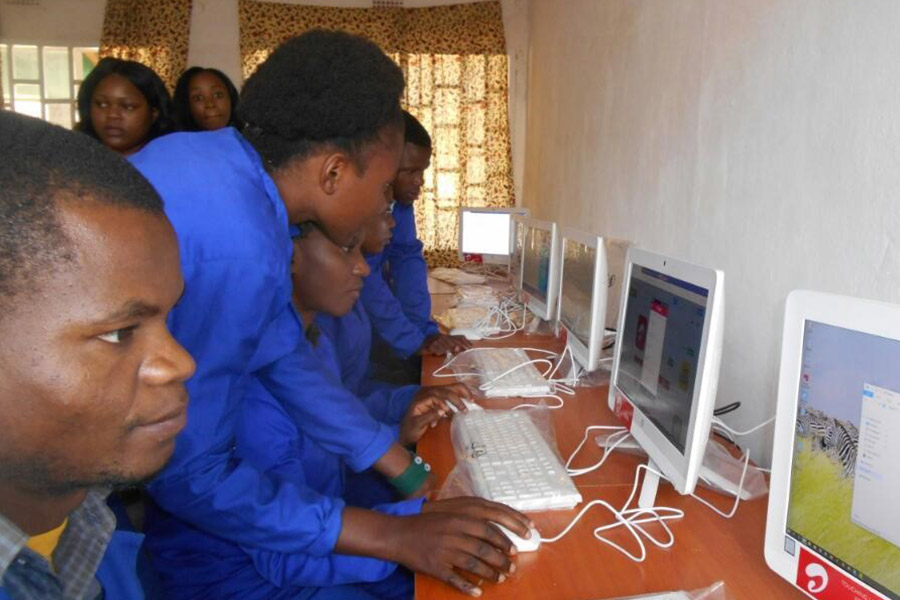The phrase “gender-based violence” conjures up a lot of different images and emotions for different people. For some, it means rape or forced sex. For others, it means coercion based on gendered power. And for others it means intimate partner violence. No matter what gender-based violence, or GBV, means to you, it is seriously holding back the young women and girls of Malawi.
With few opportunities for quality employment for Malawian youth, one of the best options for a stable future is to go to a technical, entrepreneurial, and vocational education training (TEVET) college. There, students can learn a trade or other practical skill. However, women’s enrollment at these institutions sits at 27 percent, with the low numbers frequently attributed to rampant GBV at the colleges.
From the principal’s perspective
At Mzuzu Technical College the principal knew that several male instructors had been involved in sexual exploitation cases. He hopes that by having more open discussions about what is happening will bring the detrimental effects to light, and allow a space for solutions to be discussed.
Mbandira Technical College is in Karonga, the most rural part of Malawi. There, the female principal is challenging the traditional gender roles where women are expected to be submissive and men are considered leaders. She’s actively recruited female instructors to what was previously an all-male staff with the hopes that a more gender-balanced faculty will have an impact on the cases of GBV.
Hearing about the cases of gender-based violence that happens on their campus, particularly especially extreme and egregious incidents, has an impact on the principals. At Nasawa Community College in Zomba, the principal was moved to tears as she recounted the days where she had to deal with a female student who was raped by five other students.
“I do not want to experience that again as a principal, I was touched as a mother, as well as for being a principal for those boys,” she said.
What the instructors have to say
At Chilobwe Technical College, the female students are being sexually violated when they go for their attachment, or internship. One of the instructors was dismayed by this and said that refusing to pay salaries and demanding sexual exchanges should lead to dismissal; and that there should be no sympathy for the perpetrators. He went on to say that the instructors should be the leading examples for explaining issues of GBV.
However, at Mbandira Technical College, one instructor wouldn’t comment on the issue of GBV at the school. He did say that it will take a long time to change the attitudes of men and boys in the country, and that a lot of normalised, harmful attitudes have allowed GBV to flourish.
What the students have to say
All that being said, those who are most affected are the students at the TEVET colleges.
A student at Mbandira Technical College explained that it’s not easy to be in a class that is dominated by men. Some of her female classmates have even left.
“This is due to fear of men,” she said. “Female students at this college are exploited, sometimes sexually harassed. Fear or threat of violence must not restrict girls from living free and full lives, or from realizing their full potential.”
At Chilobwe Technical College, where female students are sexually abused when completing their attachments, one student shared her horror at being sent for an attachment with all male supervisors.
“I would rather graduate without getting my attachments. It is not right for these male supervisors to take our salaries in exchange for sex. They know we can’t survive without it,” the resentful student said.
As for one male student at Nasawa Community College, where the female student was raped by five other students, he was shocked that his peers would do that to a fellow student and believes that interventions need to focus on the perpetrators, not the victim.
“Engaging young boys and young men is essential to shape their attitudes, challenging harmful norms and empowering them to be potential agents for positive change, rather than viewing them as the problem,” the student said.
All of these stories add up to one thing: something must be done to end GBV on the TEVET campuses. That’s why we are implementing a new project, aimed at ending GBV at TEVET colleges through the arts. Students, staff, and administrators will learn about participatory arts. From there, they will design, create, and implement a campaign at their college to inform the college community and encourage reporting and response. We expect to see improvement in students’ capacity to lead in the fight against GBV, improved reporting and response to GBV, as well as improved knowledge, attitudes and practices with regard to GBV.
The programme is supported through the Skills and Technical Education Programme (STEP), an initiative partially implemented by UNESCO with funding from the European Union.
Want more stories like this? Sign up for our monthly newsletter today, and get them sent straight to your inbox.
Tagged: TEVET, Gender-based violence, training, Arts



